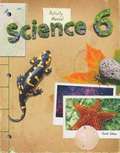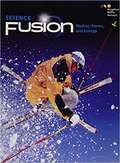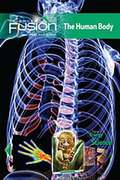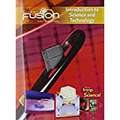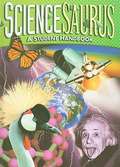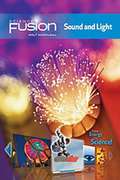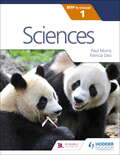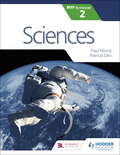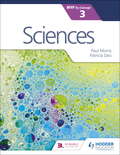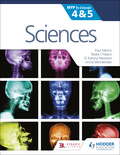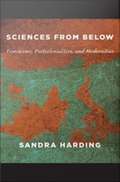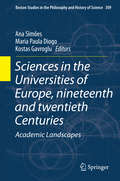- Table View
- List View
Science: Matter and Energy Quizzes
by Jeremy Foster Christine Hotke James RidgleyAs a parent, you know that you must inspect what you expect. Inspection provides key motivation to your teen to work hard and provides you with valuable assessment of his strengths and weaknesses as you guide his progress. Let A Beka help you make that inspection easy with these ready-made quizzes. The quiz book correlates with the text Science: Matter and Energy (2012), Science: Matter and Energy Tests, and Science: Matter and Energy Teacher Edition, which includes the curriculum/lesson plans. Answers and grading guidance are sold separately in Science: Matter and Energy Quiz Key. Grade 9. <p><p> Product Features<p> · The 39 quizzes provide weekly reinforcement of concepts.<br> · Each quiz contains 10 objective questions, taking a minimum of class time to take and to grade.<br> · A variety of formats such as multiple choice, modified true/false, matching, completion, and math problems prepares your teen for the tests and verifies that he understands a concept, no matter how it is presented.<br> · Each quiz includes the page numbers it covers in the text, making the quizzes adaptable to your schedule and your teen’s learning progress.
Science: Matter and Energy Tests
by Jeremy Foster Christine Hotke James RidgleySafety principles, repair basics, innovation tools—all depend on a proper understanding of God’s principles of design and His laws governing the universe. From Bernoulli’s principle to the second law of thermodynamics, you can know that your teen is understanding how some things work while other things can’t through these well-designed tests that reinforce and evaluate his learning. The test book is correlated with the texts Science: Matter and Energy (2012), Science: Matter and Energy Laboratory Manual, Science: Matter and Energy Quizzes, and Science: Matter and Energy Teacher Edition, which includes the curriculum/lesson plans. Answers and grading guidance are sold separately in Science: Matter and Energy Test Key. Grade 9.<p><p> Product Features<p> · Objective questions in a variety of formats test on multiple levels from recall and understanding to application.<br> · Since mathematics is the language of science, many tests include an application section of math problems corresponding to the problems demonstrated and practiced in the text. Your teen will see the necessity of both math skills and scientific knowledge as they are applied to practical life situations.<br> · Essay questions take your teen’s thinking skills to a higher level as he must explain the hows and whys of science. They also open his eyes to note God’s design in the physical world and to consider how things of man’s design work. Noting others’ creativity may lead to his own!<br> · Testing every three weeks (for a total of 12 tests) provides vital reinforcement of learning and an opportunity for your evaluation of your teen’s comprehension.<br> · Two nine-weeks exams and semester and final exams further reinforce concepts. Exposure to the concepts through reading, discussion, demonstration and practice, independent work, quizzes, tests, and then review examinations cements course content.<br> · Since every test clearly indicates the sections of the text it covers, you can adjust test taking to your teen’s progress through the text.<br> · As with all A Beka tests, the content and design reflect our half century of educational experience. directions are easy to understand and the layout is appealing. Test content is clearly covered in the course materials and is appropriate for the grade level.
Science: Order & Design
by Jeremy Foster Delores Shimmin Dawn Mckenzie Erica Martin Laurel Hicks Gregory RickardStudents are introduced to the scientific method and encouraged to apply it throughout this Christian life science text. They investigate fields such as botany, anatomy, zoology, microbiology, and ecology with the goal of discovering the thoughts of the Creator through the ingenious structure and orderly function of His creation.
Science: Student Activity Manual, Grade 6
by Bju PressThe Science 6 Activity Manual provides pages to record results and conclusions for Activities as well as reinforcement pages, study guides, and enrichment pages.
Science: Teaching School Subjects 11-19 (Teaching School Subjects 11-19)
by Keith S. Taber Vanessa KindIn recognizing that new teachers often feel disempowered by the subject expertise they bring into teaching, this book not only covers the training standards for NQTs and the Induction Standards, but takes the reader beyond this by fully exploring issues relating to subject knowledge in learning to teach.Divided into three sections the book covers: framing the subject - defining subject knowledge and focusing on questions about science as a school subject teaching the subject - looking at pedagogical, curricular and pupil knowledge science within the professional community - focusing on the place of science within the wider curriculum and the teaching community. This refreshing new book provides stimulating assistance to subject specialists, from new teachers of science in the early years of professional development to those on a PGCE course or in their induction year. It is also suitable for subject leaders with mentor responsibilities and Advanced Skills Teachers undertaking specialist inset and teaching support.
Science: Teaching School Subjects 11-19 (Teaching School Subjects 11-19)
by Keith Taber Vanessa KindIn recognizing that new teachers often feel disempowered by the subject expertise they bring into teaching, this book not only covers the training standards for NQTs and the Induction Standards, but takes the reader beyond this by fully exploring issues relating to subject knowledge in learning to teach. Divided into three sections the book covers: framing the subject - defining subject knowledge and focusing on questions about science as a school subject teaching the subject - looking at pedagogical, curricular and pupil knowledge science within the professional community - focusing on the place of science within the wider curriculum and the teaching community. This refreshing new book provides stimulating assistance to subject specialists, from new teachers of science in the early years of professional development to those on a PGCE course or in their induction year. It is also suitable for subject leaders with mentor responsibilities and Advanced Skills Teachers undertaking specialist inset and teaching support.
Science: Technology and Society Sourcebook
by Holt Rinehart Winston StaffScienceplus Sourcebook for High School
Science: The Diamond Edition
by Scott ForesmanA book about Living and Non-living things, Habitats, How Plants and Animals Live, Life Cycles and Food Chains.
Science: The Diamond Edition
by Scott ForesmanThis book contains topics on Life Science (Classification, Cells, Reproduction, Body Systems, Plants, Biomes, Plate Tectonics, Rocks and Minerals and Reshaping Earth's Surface), Earth Science (Earth's Resources, Climate and Weather), Physical Science (Matter, Building Blocks of Matter, Forces and Motion, Machines, Changing Energy Forms, Thermal and Light Energy), Space and Technology (Earth, Sun, and Moon, The Universe and Impacts of Technology).
ScienceFusion Interactive Worktext: Module I: Motion, Forces, And Energy
by Houghton Mifflin Harcourt StaffScienceFusion: Student Edition Interactive Worktext Module I: Motion, Forces, and Energy 2017
ScienceFusion, Module C: The Human Body (Interactive Worktext Grades 6-8,)
by The Editors at the Holt McDougalThis book with a student centred approach features: Learning science concepts and vocabulary Building inquiry, STEM, and 21st Century Skills Incorporating math and writing in each science lesson.
ScienceFusion: Introduction to Science and Technology
by Houghton Mifflin HarcourtScience Fusion Introduction to Science and Technology.
ScienceSaurus: A Student Handbook
by Great Source Education GroupScienceSaurus is a resource book and a student handbook that offers step-by-step guidelines and clear examples of key science topics that include Life Science, Earth Science and Physical Science.
ScienceSaurus: A Student Handbook
by Houghton Mifflin HarcourtScienceSaurus is a user-friendly resource that you can turn to whenever you have any questions related to science. Packed with useful information, ScienceSaurus addresses key science topics including: * doing science * life science * earth science * physical science * natural resources and the environment * science, technology, and engineering
Sciencefusion: Student Edition Interactive Worktext Grades 6-8 Module J: Sound And Light 2012 (Sciencefusion)
by Houghton Mifflin Harcourt Publishing Company StaffA science textbook
Sciences for the IB MYP 1
by Paul Morris Patricia DeoExam Board: IBLevel: MYPSubject: ScienceFirst Teaching: September 2016First Exam: June 2017Develop your skills to become an inquiring learner; ensure you navigate the MYP framework with confidence using a concept-driven and assessment-focused approach to Sciences presented in global contexts.- Develop conceptual understanding with key MYP concepts and related concepts at the heart of each chapter.- Learn by asking questions with a statement of inquiry in each chapter. - Prepare for every aspect of assessment using support and tasks designed by experienced educators.- Understand how to extend your learning through research projects and interdisciplinary opportunities.
Sciences for the IB MYP 1
by Paul MorrisExam Board: IBLevel: MYPSubject: ScienceFirst Teaching: September 2016First Exam: June 2017Develop your skills to become an inquiring learner; ensure you navigate the MYP framework with confidence using a concept-driven and assessment-focused approach to Sciences presented in global contexts.- Develop conceptual understanding with key MYP concepts and related concepts at the heart of each chapter.- Learn by asking questions with a statement of inquiry in each chapter. - Prepare for every aspect of assessment using support and tasks designed by experienced educators.- Understand how to extend your learning through research projects and interdisciplinary opportunities.Contents1 What do scientists do?2 What changes?3 How do living things work?4 What makes change happen?5 How can we study the living world?6 Where do we fit into the world?GlossaryAcknowledgementsIndex
Sciences for the IB MYP 2
by Paul Morris Patricia DeoExam Board: IBLevel: MYPSubject: ScienceFirst Teaching: September 2016First Exam: June 2017Develop your skills to become an inquiring learner; ensure you navigate the MYP framework with confidence using a concept-driven and assessment-focused approach to Sciences presented in global contexts.- Develop conceptual understanding with key MYP concepts and related concepts at the heart of each chapter.- Learn by asking questions with a statement of inquiry in each chapter. - Prepare for every aspect of assessment using support and tasks designed by experienced educators.- Understand how to extend your learning through research projects and interdisciplinary opportunities.Contents list1 Where are we now and where are we going? 2 How do we map matter?3 Who are we? 4 How can we find out? 5 How does our planet work?6 How do we respond to our world?
Sciences for the IB MYP 3
by Paul Morris Patricia DeoA concept-driven and assessment-focused approach to Sciences teaching and learning.- Approaches each chapter with statements of inquiry framed by key and related concepts, set in a global context- Supports every aspect of assessment using tasks designed by an experienced MYP educator- Differentiates and extends learning with research projects and interdisciplinary opportunities- Applies global contexts in meaningful ways to offer an MYP Sciences programme with an internationally-minded perspective
Sciences for the IB MYP 3
by Paul Morris Patricia DeoA concept-driven and assessment-focused approach to Sciences teaching and learning.- Approaches each chapter with statements of inquiry framed by key and related concepts, set in a global context- Supports every aspect of assessment using tasks designed by an experienced MYP educator- Differentiates and extends learning with research projects and interdisciplinary opportunities- Applies global contexts in meaningful ways to offer an MYP Sciences programme with an internationally-minded perspective
Sciences for the IB MYP 4&5: MYP by Concept
by Paul Morris Radia Chibani Kahina Meziane Anna MichaelidesDevelop your skills to become an inquiring learner; ensure you navigate the MYP framework with confidence using a concept-driven and assessment-focused approach to Sciences presented in global contexts.· Develop conceptual understanding with key MYP concepts and related concepts at the heart of each chapter. · Learn by asking questions for a statement of inquiry in each chapter. · Prepare for every aspect of assessment using support and tasks designed by experienced educators.· Understand how to extend your learning through research projects and interdisciplinary opportunities.· Think internationally with chapters and concepts set in global contexts.
Sciences for the IB MYP 4&5: MYP by Concept
by Paul Morris Radia Chibani Kahina Meziane Anna MichaelidesDevelop your skills to become an inquiring learner; ensure you navigate the MYP framework with confidence using a concept-driven and assessment-focused approach to Sciences presented in global contexts.· Develop conceptual understanding with key MYP concepts and related concepts at the heart of each chapter. · Learn by asking questions for a statement of inquiry in each chapter. · Prepare for every aspect of assessment using support and tasks designed by experienced educators.· Understand how to extend your learning through research projects and interdisciplinary opportunities.· Think internationally with chapters and concepts set in global contexts.
Sciences from Below: Feminisms, Postcolonialities, and Modernities
by Sandra HardingIn Sciences from Below, the esteemed feminist science studies scholar Sandra Harding synthesizes modernity studies with progressive tendencies in science and technology studies to suggest how scientific and technological pursuits might be more productively linked to social justice projects around the world. Harding illuminates the idea of multiple modernities as well as the major contributions of post-Kuhnian Western, feminist, and postcolonial science studies. She explains how these schools of thought can help those seeking to implement progressive social projects refine their thinking to overcome limiting ideas about what modernity and modernization are, the objectivity of scientific knowledge, patriarchy, and Eurocentricity. She also reveals how ideas about gender and colonialism frame the conventional contrast between modernity and tradition. As she has done before, Harding points the way forward in Sciences from Below. Describing the work of the post-Kuhnian science studies scholars Bruno Latour, Ulrich Beck, and the team of Michael Gibbons, Helga Nowtony, and Peter Scott, Harding reveals how, from different perspectives, they provide useful resources for rethinking the modernity versus tradition binary and its effects on the production of scientific knowledge. Yet, for the most part, they do not take feminist or postcolonial critiques into account. As Harding demonstrates, feminist science studies and postcolonial science studies have vital contributions to make; they bring to light not only the male supremacist investments in the Western conception of modernity and the historical and epistemological bases of Western science but also the empirical knowledge traditions of the global South. Sciences from Below is a clear and compelling argument that modernity studies and post-Kuhnian, feminist, and postcolonial sciences studies each have something important, and necessary, to offer to those formulating socially progressive scientific research and policy.
Sciences in the Universities of Europe, Nineteenth and Twentieth Centuries
by Ana Simões Maria Paula Diogo Kostas GavrogluThis book focuses on sciences in the universities of Europe in the nineteenth and twentieth centuries, and the chapters in it provide an overview, mostly from the point of view of the history of science, of the different ways universities dealt with the institutionalization of science teaching and research. A useful book for understanding the deep changes that universities were undergoing in the last years of the 20th century. The book is organized around four central themes: 1) Universities in the longue durée; 2) Universities in diverse political contexts; 3) Universities and academic research; 4) Universities and discipline formation. The book is addressed at a broad readership which includes scholars and researchers in the field of General History, Cultural History, History of Universities, History of Education, History of Science and Technology, Science Policy, high school teachers, undergraduate and graduate students of sciences and humanities, and the general interested public.

